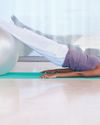
Relaxation is an essential addition to our wellbeing toolkit, but it’s not always easy to accomplish, especially in challenging circumstances such as those we’ve all been experiencing. But learning to do it right could give your health a much-needed boost.
‘Relaxation is vital to our health and wellbeing, as well as our immune function,’ says natural health and wellness expert Dr Tim Bond. ‘Researchers at Harvard Medical School discovered that in people practising relaxation methods, such as yoga and meditation, far more “disease-fighting genes” were active, compared to those who didn’t practise. In particular, they found genes were switched on thathelp to protect from disorders such as pain, infertility, high blood pressure and even rheumatoid arthritis.’
And that’s not all. The art of relaxation also drives higher levels of feel-good chemicals, such as serotonin and growth hormones, which repair cells and tissue. ‘In essence, relaxation has virtually the opposite effect to stress, lowering heart rate, boosting immunity and enabling the body to thrive,’ says Dr Bond. ‘An example is when women menstruate, they often find taking a long bath or doing some gentle relaxation exercises helps their general wellbeing.’
This story is from the July 2020 edition of Woman & Home Feel Good You.
Start your 7-day Magzter GOLD free trial to access thousands of curated premium stories, and 9,000+ magazines and newspapers.
Already a subscriber ? Sign In
This story is from the July 2020 edition of Woman & Home Feel Good You.
Start your 7-day Magzter GOLD free trial to access thousands of curated premium stories, and 9,000+ magazines and newspapers.
Already a subscriber? Sign In

Reach new heights in the DOLOMITES
Breathtaking Alpine views, farm-to-table food and a game-changing spa... you'll I never want to leave this gem

NOTHING TO see here
Don't let those pesky PDWs* hold you back. Style them out with our expert advice

BURN while you EARN!
Meet the three women who made work a workout...

WALK this way!
A daily stroll can make all the difference to your wellbeing

15-minute TOTAL TONE-UP
Feel stronger and leaner in four weeks with our at-home Pilates workout

What a PAIR!
Mixing certain foods together can give your body a health boost. Give these tasty duos a try

The SHAPE of YOU
Unlock the key to better health and fitness by understanding your body type

ANIMAL MAGIC
Can a four-legged friend help you live longer? Health editor and dog owner Tanya Pearey investigates....

Signs you're too stressed
Your body could be trying to tell you something...

Is it time you said No?
It's good to be kind, but too much people pleasing can lead to burnout